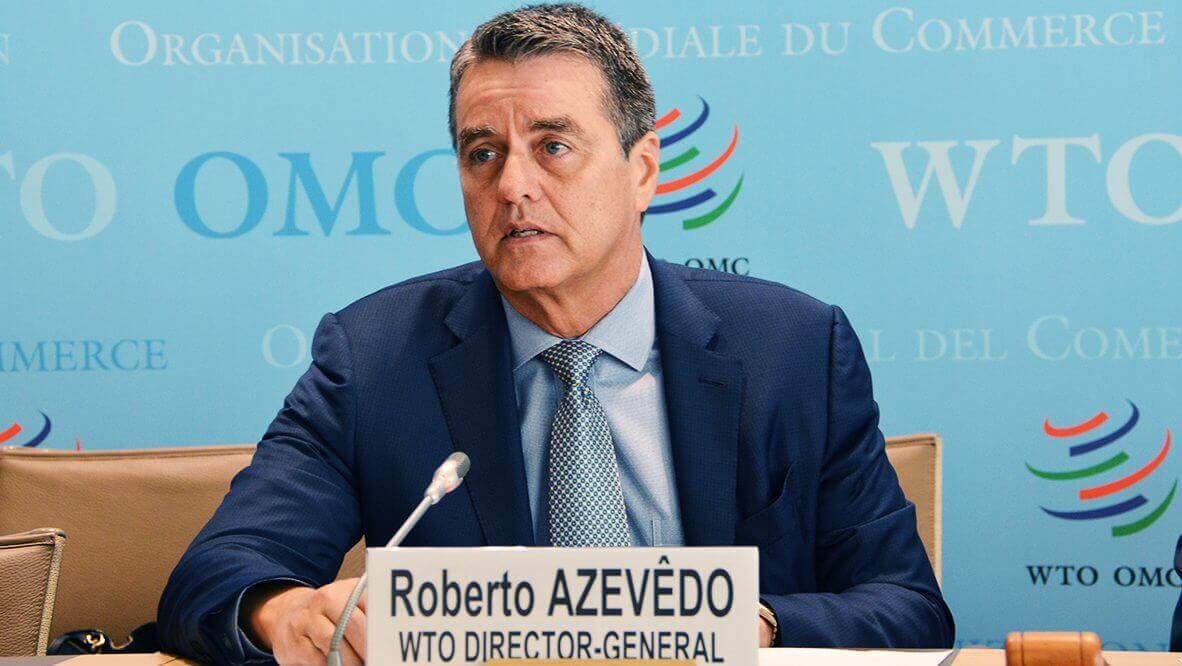The World Trade Organisation (WTO) chief Roberto Azevedo resigned unexpectedly on Thursday amid the coronavirus pandemic that has left trade and the world economy and reeling and resulted in countries bracing for the worst economic downturn since the Great Depression. The WTO put out a statement saying the Azevedo would be stepping down from his post as Director-General on August 31, “cutting his second term short by exactly one year”. Azevedo’s surprise departure comes as the WTO is faced with the impact of the coronavirus pandemic and criticism from US President Donald Trump.
Azevedo said his early departure as the WTO’s director-general was a “personal decision” that was in the best interests of the organisation. The 62-year-old Brazilian career diplomat’s second four-year term was not scheduled to end until September 2021. The Director-General also emphasised on the fact that bringing forward his departure would allow members to select his successor in the coming months, without diverting political energy and attention from preparations for the Twelfth Ministerial Conference, which is set to be held in 2021.
He further said that he will be working to improve and strengthen this Organization until his last day in office–and beyond. “The WTO may not be perfect, but it is indispensable all the same. It is what keeps us from a world where the law of the jungle prevails, at least as far as trade is concerned,” he added.
Meanwhile, Trump has accused the body of treating America unfairly. The Trump administration has repeatedly accused the global trade watchdog of having strayed from its purpose of liberalising and protecting markets, and that conditions around China’s entry into the organisation in 2001 have led to millions of American job losses. When asked about Mr Azevedo’s exit, Trump, who had previously said the US would leave the organisation if it didn't change, said he was “OK with it”. “We’ve been treated very badly... They treat China as a developing nation. Therefore China gets a lot of the benefits that the US doesn’t get,” he added.
The Trump administration has tried to undercut the efforts of the WTO on numerous occasions. Since December 2019, the US has obstructed the WTO’s trade dispute resolution body by blocking the appointment of judges to the organisation’s top court, the Appellate Body. In the absence of a three-judge quorum, the body has too few officials to rule on major trade disputes.
Along with the US, other WTO members, including Japan and the European Union (EU), have pushed for the WTO to make far-reaching reforms. In the recent past, countries have failed to reach any further multilateral agreements, including on fisheries subsidies. In fact, since 2017, the WTO has struggled to deal with a US administration that is openly hostile to its multilateral approach.
Right now, global trade seems under threat in a way it hasn’t been since the Cold War, with the coronavirus crisis having brought much of international commerce to a halt. The WTO predicts that trade could decline this year by as much as 32%. World merchandise volumes, which almost always grow once you smooth out month-to-month volatilities, had been in decline for nearly a year even before the outbreak hit.
Additionally, the US-China trade deal announced with great fanfare in January might not end up bridging the differences between the two largest economies, with the US President now threatening to “cut off” ties with–and move global supply chains away from–China. The growing tensions between the world’s two largest economies have only further compounded the difficulty of pushing through reforms and building consensus within the WTO. As Trump ramps up his anti-Chinese rhetoric, this can only add further tensions to an already fragile global trading system and further disempower an already embattled WTO.
Image Source: Tunisie Numerique

